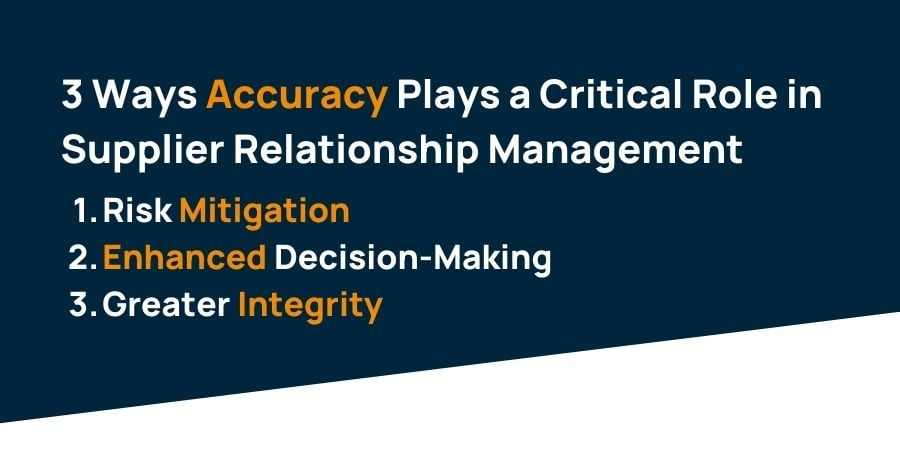Improving Broker and Supplier Relationship Management in Energy Trading
From employee rapport to customer bonds, each interaction forms a crucial part of your business fabric as you navigate this complex retail energy sector; whether as a newcomer or a seasoned entity, the right tools and partnerships are key to streamlining your operations, especially when it comes to supplier relationship management.
Retail Energy Must Prioritize Supplier and Broker Relationship Management
As the global business landscape continues to be ever-evolving, the significance of robust supplier-broker relationships in the retail energy sector cannot be overstated. These relationships are much more than mere business transactions; they are strategic alliances that can greatly influence the success and resilience of your business.
Building a Foundation of Trust and Reliability
A solid supplier-broker relationship is fundamentally built on trust and reliability. This mutual trust is not developed overnight but is cultivated over time through consistent and honest interactions. In an industry where market conditions can change rapidly, having a reliable broker who understands your business needs and priorities is invaluable. Similarly, brokers seek suppliers who are not just vendors but partners in their success, offering products and services that align with their goals.
Navigating Market Uncertainties Together
The current global business environment is fraught with uncertainties, from fluctuating energy prices to regulatory changes and geopolitical tensions. In such a scenario, a strong relationship between suppliers and brokers serves as an anchor. It provides a sense of stability and certainty, enabling both parties to make informed decisions and adapt strategies swiftly in response to market changes.
Shared History Leading to Mutual Growth
Established relationships, characterized by a shared history and experiences, foster a deeper understanding and alignment of business objectives. This synergy is crucial for exploring new market opportunities and innovating solutions that meet the evolving demands of the energy sector. Suppliers and brokers who have weathered market ups and downs together are better positioned to capitalize on growth opportunities and expand their reach.

Collaborative Approach to Problem-solving
When challenges arise, be it logistical issues, supply chain disruptions, or customer service queries, a strong partnership ensures that both parties work together toward a solution. This collaboration not only resolves immediate issues but also strengthens the relationship, building a foundation for long-term success.
Enhancing Reputation and Credibility
Satisfied brokers are likely to become advocates for your services, leading to new business opportunities and an expanded client base. Similarly, suppliers known for maintaining strong broker relationships are viewed as reliable and trustworthy partners, attracting more brokers to collaborate with.
Communication is Key
This is the lifeblood of any thriving supplier-broker relationship in the energy sector. It goes beyond mere exchange of information; it's about building a rapport, understanding needs, and aligning goals. In a market that's rapidly shifting towards remote work, the channels and consistency of communication take on even greater significance.
Fostering Open and Transparent Dialogues
Regular, honest dialogues about market trends, changes in policy, and operational challenges help both parties stay on the same page. It's important for suppliers to not only share information about their products and services but also to engage in discussions about broader industry developments.
Utilizing Modern Communication Tools
Video conferencing, collaborative online platforms, and instant messaging can bridge the gap created by physical distance. These tools ensure that communication is not just frequent but also effective, enabling real-time discussions and quicker decision-making.
Building a Culture of Continuous Feedback
Effective communication is not a one-way street. It requires active listening and responding to feedback. Suppliers should encourage brokers to share their insights and suggestions. This continuous feedback loop can lead to improvements in service delivery, product offerings, and overall relationship management.
Customizing Communication Strategies
Different brokers may have different communication preferences. Some may prefer detailed email updates, while others might prefer quick phone calls or messages. Understanding and adapting to these preferences demonstrates respect for their time and work style, further strengthening the relationship.
Accuracy is Everything in Supplier Relationship Management
Accuracy in supplier relationship management is critical for ensuring a smooth and efficient supply chain in the retail energy sector. Accurate information is not just a matter of operational necessity; it's also about building trust and credibility with your brokers.
Importance of Data Accuracy
Inaccurate data can lead to significant issues like incorrect order fulfillment, billing errors, and misaligned inventory levels. Ensuring the accuracy of data, from pricing information to delivery schedules, is essential for maintaining operational efficiency and preventing costly mistakes.
Risk Mitigation Through Accurate Forecasting
Accurate forecasting is vital for managing risks in the volatile energy market. Suppliers need to predict demand accurately to avoid overstocking or understocking, which can lead to increased costs or missed sales opportunities. Accurate forecasting also helps in better negotiating terms with brokers, aligning with their needs and expectations.
Enhancing Decision-making with Accurate Analytics
Analyzing sales trends, market demand, and customer feedback helps in making informed strategic decisions. This level of accuracy in analytics aids suppliers in tailoring their offerings to meet the market demands effectively.
Regular Audits for Data Integrity
Conducting regular audits ensures the integrity and accuracy of the data. These audits help in identifying discrepancies early on, allowing for timely corrections. Regular checks also demonstrate a commitment to maintaining high standards in business practices, further enhancing trust with brokers.
Shaping Your Retail Energy Business for Greater Growth
Strong supplier-broker partnerships can transform your retail energy business, especially when this approach is combined with other tactics like:
- Embracing Data Analytics: In the current business climate, leveraging data analytics is not just an advantage; it's a necessity. It helps in keeping your business agile and informed.
- Automated Customer Service: Utilizing chatbots and automated service tools, powered by data, can lead to faster and more accurate customer responses.
- Resource Allocation: Data-driven insights can guide optimal resource allocation, be it manpower, capital, or time, thereby enhancing operational efficiency.
- Sustainability Goals: Detailed data on energy usage patterns can aid in setting precise sustainability targets, allowing for focused and effective improvements.
Benefits You Can Experience From Energy Software
Keeping all of these strategies straight becomes seamless when you embrace the power of energy software. You’ll experience benefits like:
- Simplified Quote Generation: Advanced systems streamline quote generation, enabling brokers to tailor offers to specific customer needs and preferences, enhancing the pricing experience.
- Automated Commission Invoicing: Energy and Utility Broker Portals with automated commission invoicing reduce administrative tasks significantly. This automation ensures accurate commission calculations and processing, offering transparency and efficiency.
- Real-time Reporting: Sales managers can access immediate reports and track commissions throughout the payment cycle, ensuring clarity and accountability.
Harnessing Efficiency for Partnership Excellence in Energy Trading
Establishing strong bonds with partners and utilizing efficient tools are fundamental in the energy sector. Systems that reduce administrative burdens — such as quick quotation and contracting processes, streamlined reporting, and transparent commission management — not only enhance broker experiences but also foster deeper partnerships and make supplier relationship management seamless.
Creating greater growth in your retail energy business doesn’t stop with supplier relationship management. Another key element to master is how you handle commissions. Find 7 ways you can handle energy commissions to create major growth in your retail energy business.
Share this
You May Also Like
These Related Stories
%20(1).png?width=900&height=450&name=Untitled%20(900%20%C3%97%20450%20px)%20(1).png)
Build Trust and Win Over Energy Brokers: The Power of Precision

The Power of Partnership: Why Energy Suppliers Need Energy Brokers




